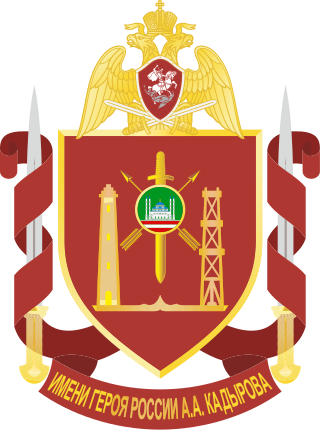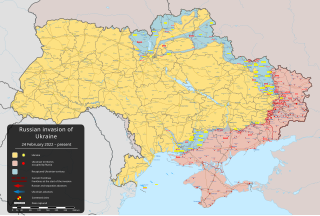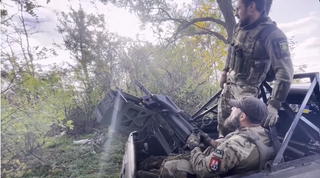
The First Chechen War, also referred to as the First Russo-Chechen War, was a struggle for independence waged by the Chechen Republic of Ichkeria against the Russian Federation from 11 December 1994 to 31 August 1996. This conflict was preceded by the battle of Grozny in November 1994, during which Russia covertly sought to overthrow the new Chechen government. Following the intense Battle of Grozny in 1994–1995, which concluded with a pyrrhic victory for the Russian federal forces, Russia's subsequent efforts to establish control over the remaining lowlands and mountainous regions of Chechnya were met with fierce resistance and frequent surprise raids by Chechen guerrillas. The recapture of Grozny in 1996 played a part in the Khasavyurt Accord (ceasefire), and the signing of the 1997 Russia–Chechnya Peace Treaty.

Baba Yaga is an enigmatic or ambiguous character from Slavic folklore who has two opposite roles. In some motifs she is described as a repulsive or ferocious-looking old woman who fries and eats children, while in others she is a nice old woman who helps out the hero. She is often associated with forest wildlife. Her distinctive traits are flying around in a wooden mortar, wielding a pestle, and dwelling deep in the forest in a hut standing on chicken legs.

The 141st Special Motorized Regiment, colloquially known as the Kadyrovites or the Akhmat special forces unit, is a paramilitary organization in Chechnya, Russia, that serves as the protection of the Head of the Chechen Republic. The term Kadyrovtsy is commonly used in Chechnya to refer to any armed, ethnically-Chechen men under the control of Head of the Chechen Republic Ramzan Kadyrov, although nominally they are under the umbrella of the National Guard of Russia. As of 2023, the regiment's official commander was Adam Delimkhanov, a close ally of Kadyrov.

TOS-1 Buratino is a Soviet 220 mm 30-barrel or 24-barrel multiple rocket launcher capable of using thermobaric warheads, mounted on a T-72 / T-90 tank chassis. TOS-1 was designed to attack enemy fortified positions and lightly armored vehicles and transports, particularly in open terrain. The system’s first combat tests took place in 1988 and 1989 in the Panjshir Valley during the Soviet–Afghan War. The TOS-1 was shown for the first time in public in 1999 in Omsk.
Drone warfare is a form of warfare using robots. Robot types include unmanned combat aerial vehicles (UCAV) or weaponized commercial unmanned aerial vehicles (UAV), unmanned surface vehicles, and ground based drones. The United States, the United Kingdom, Israel, China, South Korea, Iran, Iraq, Italy, France, India, Pakistan, Russia, Turkey, Ukraine, and Poland are known to have manufactured operational UCAVs as of 2019.

The Orlan-10 is a reconnaissance, unmanned aerial vehicle (UAV) developed by the Special Technology Center (STC) in Saint Petersburg for the Russian Armed Forces. The Orlan-10 features a composite fuselage that reduces its radar signature.

This is a timeline of the war in Donbas for the year 2020.
This is a timeline of the war in Donbas for the year 2021.

This is a timeline of the war in Donbas in early 2022. On 24 February 2022, the war in Donbas was subsumed into the eastern Ukraine campaign of the full-scale Russian invasion of Ukraine.

On 24 February 2022, Russia invaded Ukraine in a major escalation of the Russo-Ukrainian War, which started in 2014. The invasion, the largest and deadliest conflict in Europe since World War II, has caused hundreds of thousands of military casualties and tens of thousands of Ukrainian civilian casualties. As of 2024, Russian troops occupy about 20% of Ukraine. From a population of 41 million, about 8 million Ukrainians had been internally displaced and more than 8.2 million had fled the country by April 2023, creating Europe's largest refugee crisis since World War II.

The battle of Hostomel was the first major battle in the Russian invasion of Ukraine, fought for control over the town of Hostomel between the Russian and Ukrainian armed forces. As part of the Kyiv offensive, the Russian forces sought control over Hostomel, Bucha and Irpin in order to encircle and besiege the Ukrainian capital city Kyiv from the west. Due to the intensity of the Kyiv offensive, the Kyiv Oblast State Administration named Hostomel, along with Irpin, Bucha, Highway M06, and Vyshhorod as the most dangerous places in Kyiv Oblast.

Aerorozvidka is a team and NGO that promotes creating and implementing netcentric and robotic military capabilities for the security and defense forces of Ukraine. Aerorozvidka specialises in aerial reconnaissance and drone warfare. It was founded in May 2014 by a team which included Ukrainian battalion commander Natan Chazin. Its founder, Volodymyr Kochetkov-Sukach, was an investment banker who was killed in the Russo-Ukrainian War in 2015.

There have been attacks in mainland Russia as a result of the Russian invasion of Ukraine, which began on 24 February 2022. The main targets have been the military, the arms industry and the oil industry. Many of the attacks have been drone strikes, firebombing, and rail sabotage. The Ukrainian intelligence services have acknowledged carrying out some of these attacks. Others have been carried out by anti-war activists in Russia. There have also been cross-border shelling, missile strikes, and covert raids from Ukraine, mainly in Belgorod, Kursk, and Bryansk oblasts. Several times, Ukrainian-based paramilitaries launched incursions into Russia, captured border villages and battled the Russian military. These were carried out by units made up mainly of Russian emigrants. While Ukraine supported these ground incursions, it denied direct involvement.

The battle of Huliaipole is an ongoing military conflict between the Armed Forces of Russia and the Armed Forces of Ukraine over the city of Huliaipole, in central Zaporizhzhia Oblast.

In February 2022, two days after Russia's full-scale invasion, Ukraine requested American aerospace company SpaceX to activate their Starlink satellite internet service in the country to replace internet and communication networks degraded or destroyed during the war. Starlink has since been used by Ukrainian civilians, government and military. The satellite service has served for humanitarian purposes, as well as defense and attacks on Russian positions.

The ZALA Lancet is an unmanned aerial vehicle (UAV) and loitering munition developed by the Russian company ZALA Aero Group for the Russian Armed Forces. It was first unveiled in June 2019 at the ARMY-2019 military expo in Moscow. It is a further development of the ZALA Kub-BLA loitering munition. Iran claimed in April 2024 that it has manufactured a domestic analogue of the drone.

The battle of Chasiv Yar is an ongoing military engagement in the Russian invasion of Ukraine between the Russian Armed Forces and the Armed Forces of Ukraine for control of the city of Chasiv Yar and surrounding villages. The battle began on 4 April 2024 with the first direct assault on the city by Russian forces, and has thus far seen the confirmed capture of the Kanal district and the claimed capture of the Novyi district by Russia, the two easternmost of the city, and the advance of their forces to all land east of the Siverskyi Donets – Donbas Canal separating the city.


















